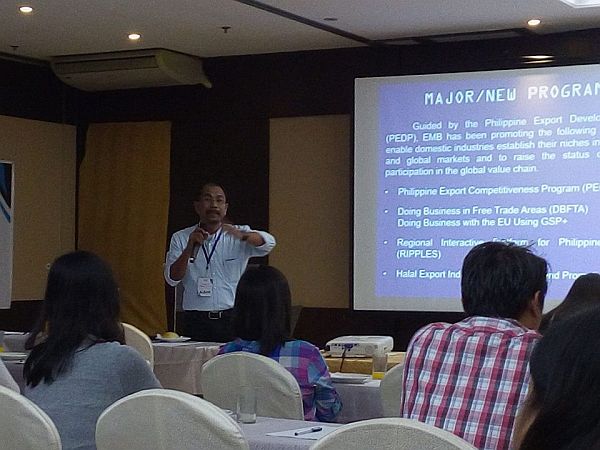Entrepreneurs urged: Explore opportunities in Halal market

Albino Ganchero, Department of Trade and Industry Halal section head, discusses the promise of investing in the Halal market at a forum in Cebu City.
CDN PHOTO/VICTOR ANTHONY V. SILVA
Local entrepreneurs are encouraged to cash in on the huge global market for Halal products.
Director Ma. Elena Arbon of the Department of Trade and Industry-Cebu (DTI-Cebu) made this call as she cited the estimated 10 million Muslims in the Philippines and around two billion of them all over the world, who have their own requirements for food they consume and the services they avail.
“We need to look at the big picture and understand what the requirements of our Muslim brothers and sisters are,” Arbon said as she opened a two-day seminar on Philippine Halal at the Golden Prince Hotel & Suites in Cebu City on Thursday.
Awareness forum
The forum is also an undertaking of the DTI to spread awareness among businesses about this sector and how entrepreneurs can cash in on these existing opportunities.
The agency invited micro, small, and medium enterprises (MSMEs) engaged in food businesses such as processed fruits and nuts, food processors, bakeries, restaurants and hotels, among others.
In two days, the MSMEs were expected to learn about market opportunities and challenges in exporting Halal-certified products, the Philippine Halal Export and Promotion Act of 2016, DTI’s programs on Halal export development promotion, as well as the Halal certification and requirements.
Halal and Haram
Halal is a term used to describe what is lawful, permissible, or legal under Shari’ah or Islamic Law.
It is an Islamic value that has a direct impact on how products are made, processed, stored, distributed, sold and consumed.
The opposite of Halal is Haram, which means “forbidden.”
Among things forbidden under Islamic Law are pigs, dogs, snakes and other animals with claws or fangs as sources of food; blood; and animals not slaughtered according to Shari’ah.
For plant-sourced food, intoxicating and hazardous plants except where toxin hazards can be removed during processing are prohibited.
Alcoholic drinks as well as all forms of intoxicating and hazardous drinks are also Haram.
It is believed among followers of Islam that when they consume Haram items, their God Allah will not receive their prayers for 40 days.
Demand for Halal
With the increasing demand for Halal in the local and global market, Arbon said there is a need for the food industry in Cebu to be informed of these types of products.
The value of the global Halal food and lifestyle sector stood at $1.9 trillion in 2015 and was projected to reach $3 trillion by 2021.
The Halal market also goes beyond food to include non-food items and services such as tourism, hospitality, entertainment, finance and fashion.
Muslim countries and even non-Muslim nations that import certain products from the Philippines such as nuts or mangoes require Halal certification for the products.
5 certification bodies
In the Philippines there are five existing Halal certification bodies, three of which are in Manila while General Santos City and Cotabato City have one each.
One of these is the Halal Development Institute of the Philippines, which the DTI invited to the two-day seminar to speak on the certification process.
“The market is huge and although the certification process is not easy, it can be done,” said Arbon.
Arbon said that much of the certification process involves industry-wide standards such as good manufacturing practice (GMP) and food traceability, among others, with the addition of Shari’ah considerations.
Protect your business
The director said those considering to tap the Halal market can expect their businesses to be protected from external factors that may affect their operations.
“One way to protect your business is to diversify your markets. If something happens to a particular market, then other markets that are stable can keep you going,” she said.
Albino Ganchero, head of DTI’s Halal section, said there is huge potential from Philippine exports if these are able to penetrate the Halal market.
Among these are pili nuts and kalamansi, which only the Philippines exports, as well as bananas, coconut-based products, mango and dried mango.
Ganchero said the Philippines is primed to supply $52 million worth of pili nuts to Malaysia in the next 10 years.
Dried mango is also getting huge demand in Japan, but Ganchero said the market requires exports to be Halal-certified.
Disclaimer: The comments uploaded on this site do not necessarily represent or reflect the views of management and owner of Cebudailynews. We reserve the right to exclude comments that we deem to be inconsistent with our editorial standards.
